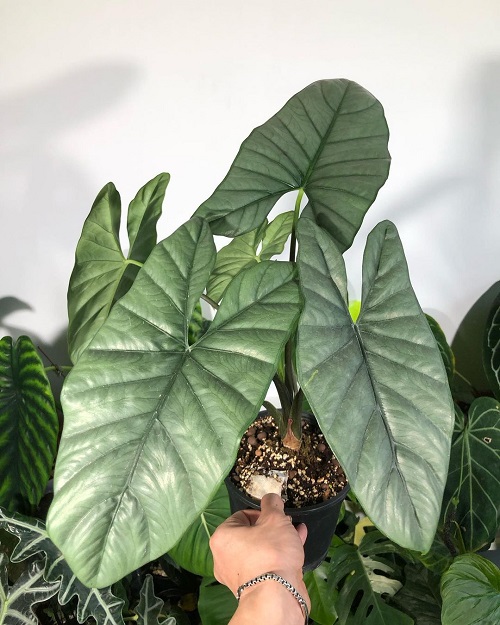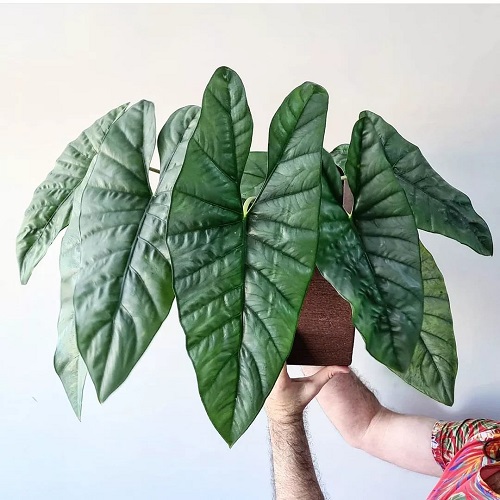Bring the beauty of the tropics to your home with Alocasia Corazon. Our expert guide covers everything you need to know about growing it!

Alocasia corazon is a popular indoor plant known for its stunning heart-shaped leaves and vibrant colors. This tropical plant is native to Southeast Asia and is a member of the Araceae family. In this article, we will explore the different aspects of growing and caring for this beautiful plant.
Have a look at the best types of Alocasias here
Alocasia Corazon Information
Alocasia Corazon is a hybrid plant in the Araceae family. It is a cross between Alocasia sanderiana and Alocasia reginula. The plant has lush, heart-shaped leaves with silver veining.
Alocasia Corazon can reach up to 3-4 feet in height and spread up to 2 feet wide. This plant is considered to be moderately easy to care for and is a great choice for those beginning their plant journey.
Learn about Growing Alocasia in Water here
Propagating Alocasia Corazon
Propagating Alocasia Corazon is a relatively simple process. The most commonly used propagation method is division, which involves dividing the plant into smaller sections and planting them in separate pots.
- Choose a healthy Alocasia Corazon plant that is mature enough to be divided.
- Remove the plant from the pot and gently shake off any excess dirt.
- Carefully divide the plant into sections using a sharp knife or pruners. Make sure that each section has at least one healthy root and some leaves.
- Plant each section in its own pot filled with well-draining soil.
- Water the sections thoroughly and place them in a warm, bright spot.
Learn about Alocasia Stingray Care Indoors here
Requirements to Grow Alocasia Corazon

Sunlight
Alocasia corazon requires bright, indirect light to thrive. Exposing it to 2-3 hours of mild morning sunlight will help it take the best color and sheen on the foliage.
Direct sunlight can scorch its leaves, so it is best to place the plant near a window that receives bright but filtered light.
Soil
Alocasia corazon prefers a well-draining soil mix that is rich in organic matter. You can make a DIY soil mix by combining equal parts of peat moss, perlite, and compost.
Learn How to Check the Soil pH at Home here
Watering
The plant requires consistent moisture, but it doesn’t like to sit in standing water. Overwatering can lead to root rot, so it is important to ensure that the soil is well-drained.
Water Alocasia corazon when the top inch of soil feels dry to the touch. Water deeply until water comes out of the drainage holes, and allow the soil to drain completely.
Here are the best ways to water plants
Temperature and Humidity
The ideal temperature range for this plant is between 60-85°F (15-29°C), and it can tolerate a minimum temperature of 55°F (13°C).
The plant prefers high humidity levels, between 60-80%. To maintain the required humidity levels, use a humidifier or place a tray filled with pebbles and water under the plant pot. Mist the leaves regularly, especially during the dry winter months.
Here are Ways To Increase Humidity For Houseplants That Work
Taking Care of Alocasia Corazon

Fertilization
While Alocasia corazon does benefit from regular fertilization during the growing season, too much fertilizer can burn the plant’s roots. Use a balanced liquid fertilizer like 10-10-10 every four to six weeks during the growing season. Dilute it to 1/2 of its strength.
Also, avoid feeding the plant in winter.
Want to Make Organic Fertilizers from Kitchen Scraps? Click here
Pests and Diseases
Pests: Scale insects, thrips, aphids, mealybugs, slugs, and snails are all common pests of Alocasia Corazon.
Diseases: Alocasia Corazon is susceptible to root and crown rot caused by the fungus Phytophthora nicotianae. It is also susceptible to bacterial and fungal leaf spots.
Use a neem oil of insecticidal soap to take care of the pests. To keep most of the diseases at bay, avoid overwatering and ensure it gets plenty of air circulation and dappled light.
Click here to learn the Amazing Natural Pesticide Recipe that can Kill any Pest
Alocasia Corazon Toxicity

The Alocasia Corazon is considered to be mildly toxic. If ingested, it can cause irritation of the mouth, throat, and stomach. It can also cause skin irritation upon contact.
If ingested in large quantities, it can cause more severe symptoms such as nausea, vomiting, and diarrhea. It is especially dangerous for pets and young children. If you suspect your pet or child has ingested any part of this plant, seek medical attention immediately.

